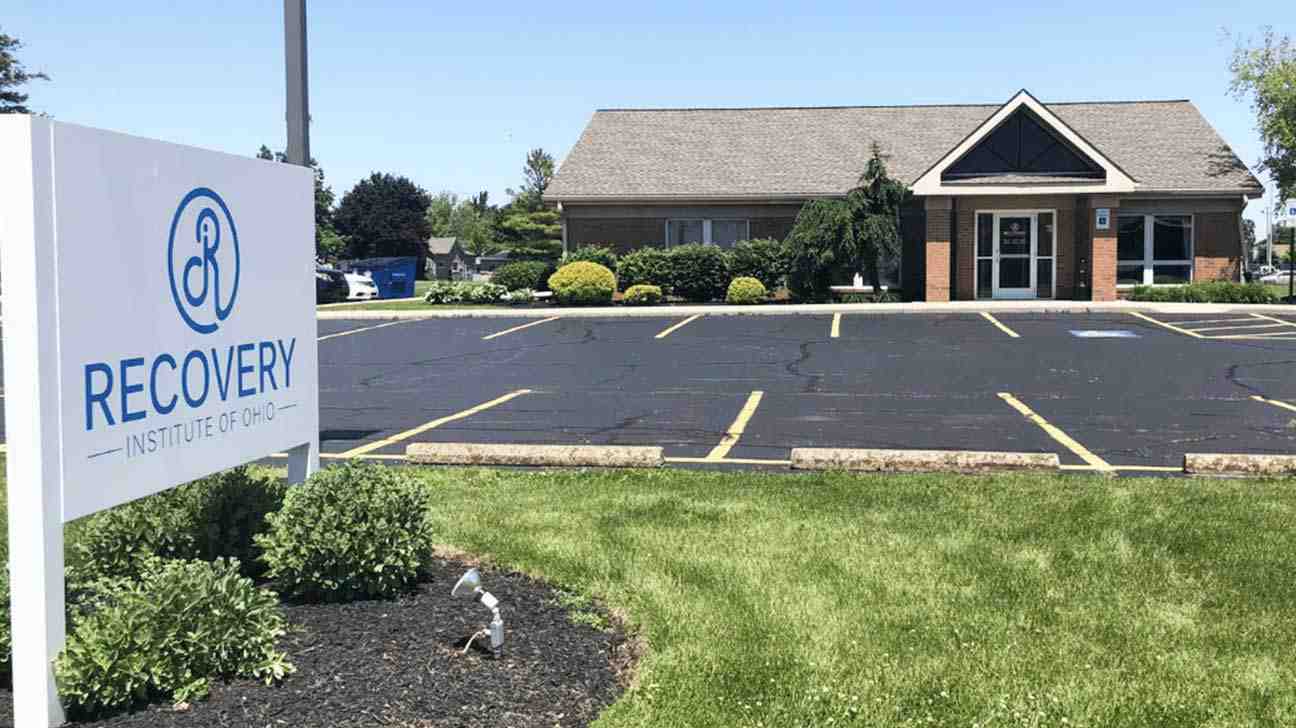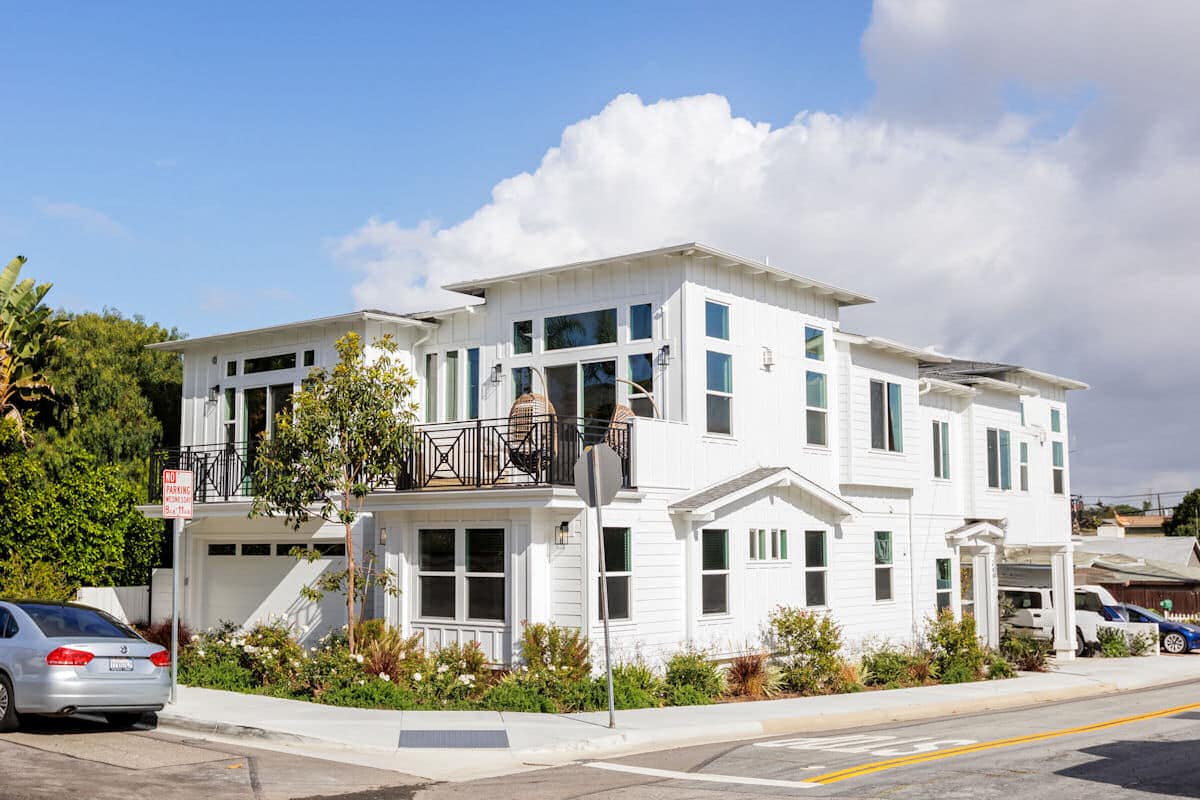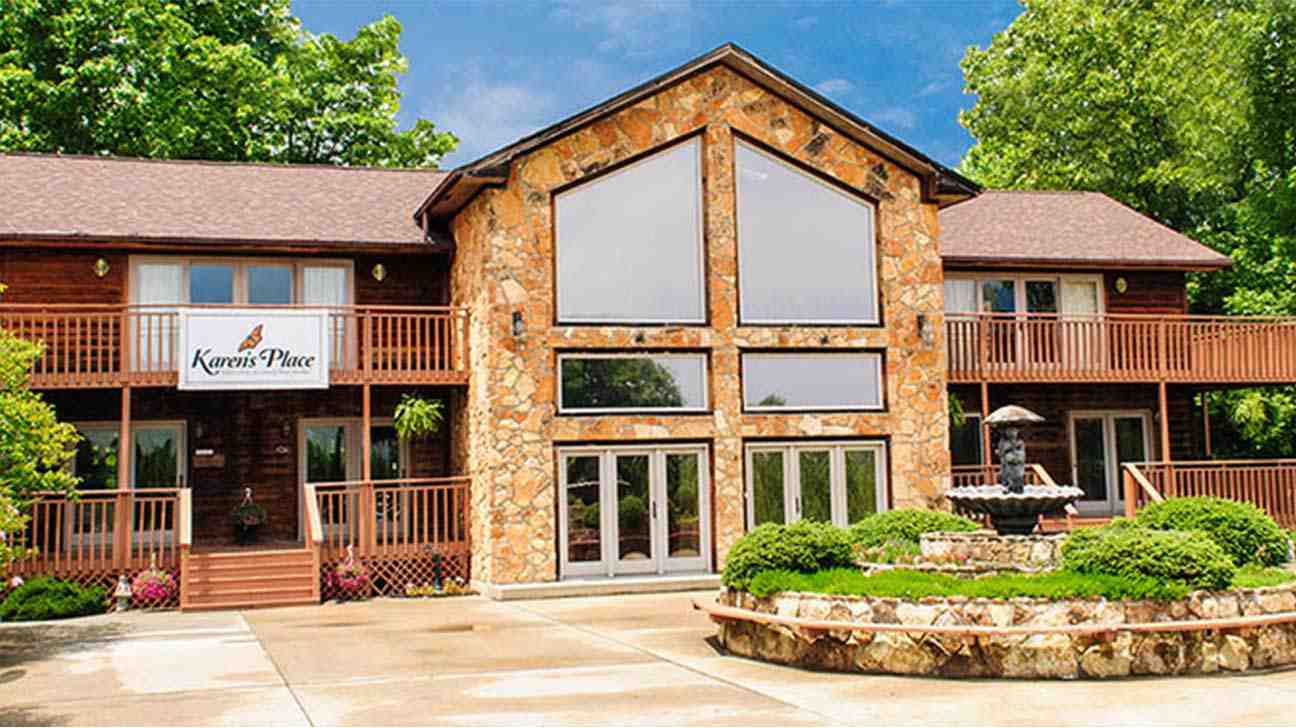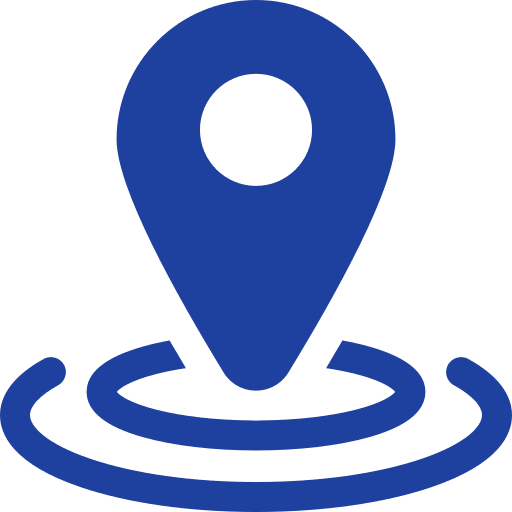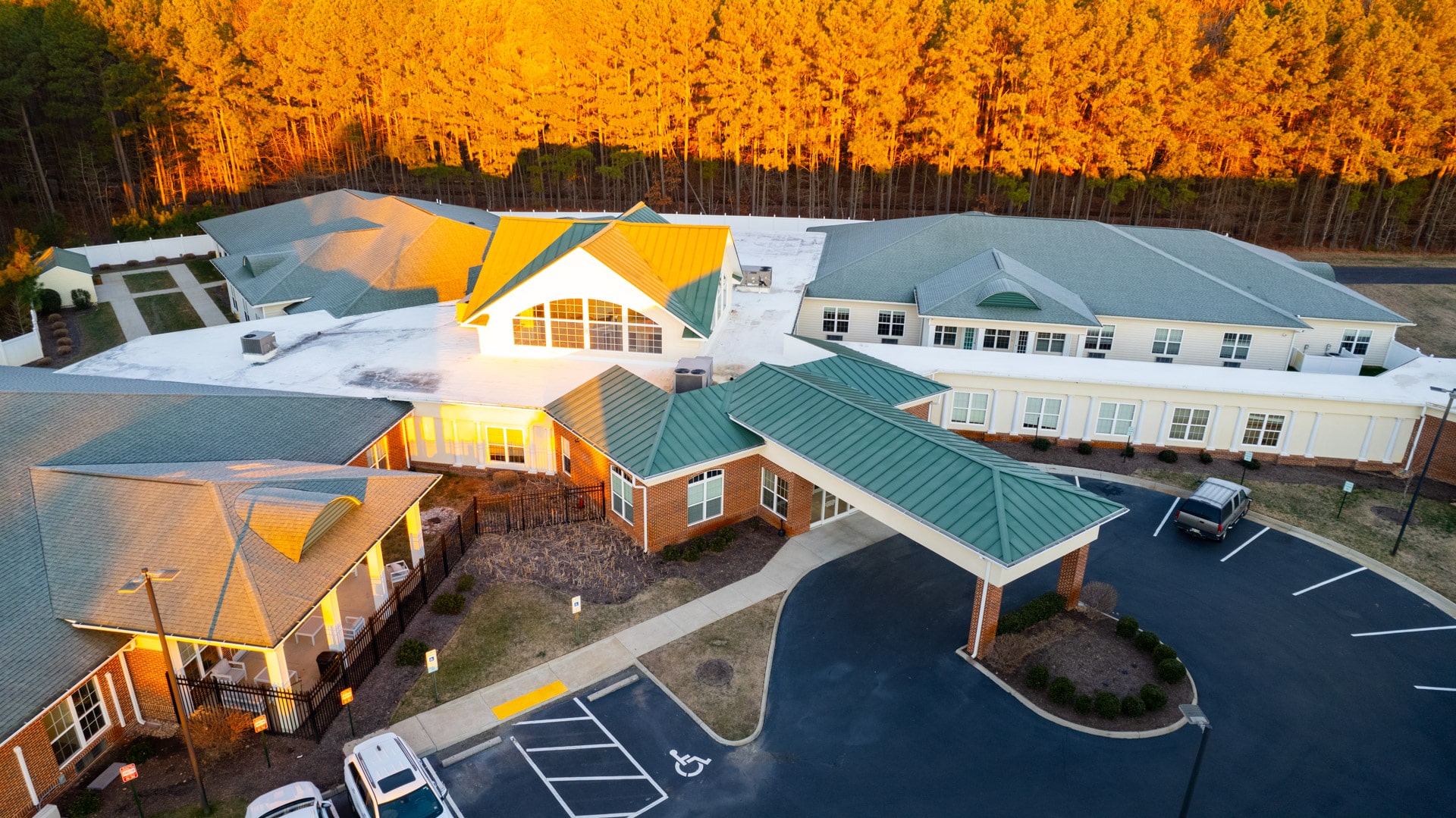
Finding the Right Alcohol Treatment Center Near You
Are you or a loved one searching for alcohol treatment centers near me? It’s tough to know where to start. But good news: help is ready. Finding the right support is the first step toward a new beginning, offering hope and a path to recovery. The “best” center is the one that fits your unique needs.
Here’s how to start finding treatment centers right now:
- Call a National Helpline: The SAMHSA National Helpline (1-800-662-HELP) offers 24/7 confidential help and treatment referrals.
- Search Online Directories: Visit FindTreatment.gov for a private tool to locate treatment facilities across the U.S.
- Connect with Local Agencies: Your state’s Bureau of Substance Abuse Services Helpline or a County Drug and Alcohol Office can offer state-specific referrals and funding info.
- Consult Your Doctor: Your healthcare provider can offer personalized advice and referrals to trusted local centers.
- Explore Support Groups: For peer support, Alcoholics Anonymous (AA) and similar groups have local chapters widely available.
This article will guide you through understanding your options and making informed choices for recovery.
At Addiction Helpline America, we understand this urgent need. Our team helps individuals and families find the right alcohol treatment centers near me to start their recovery journey.
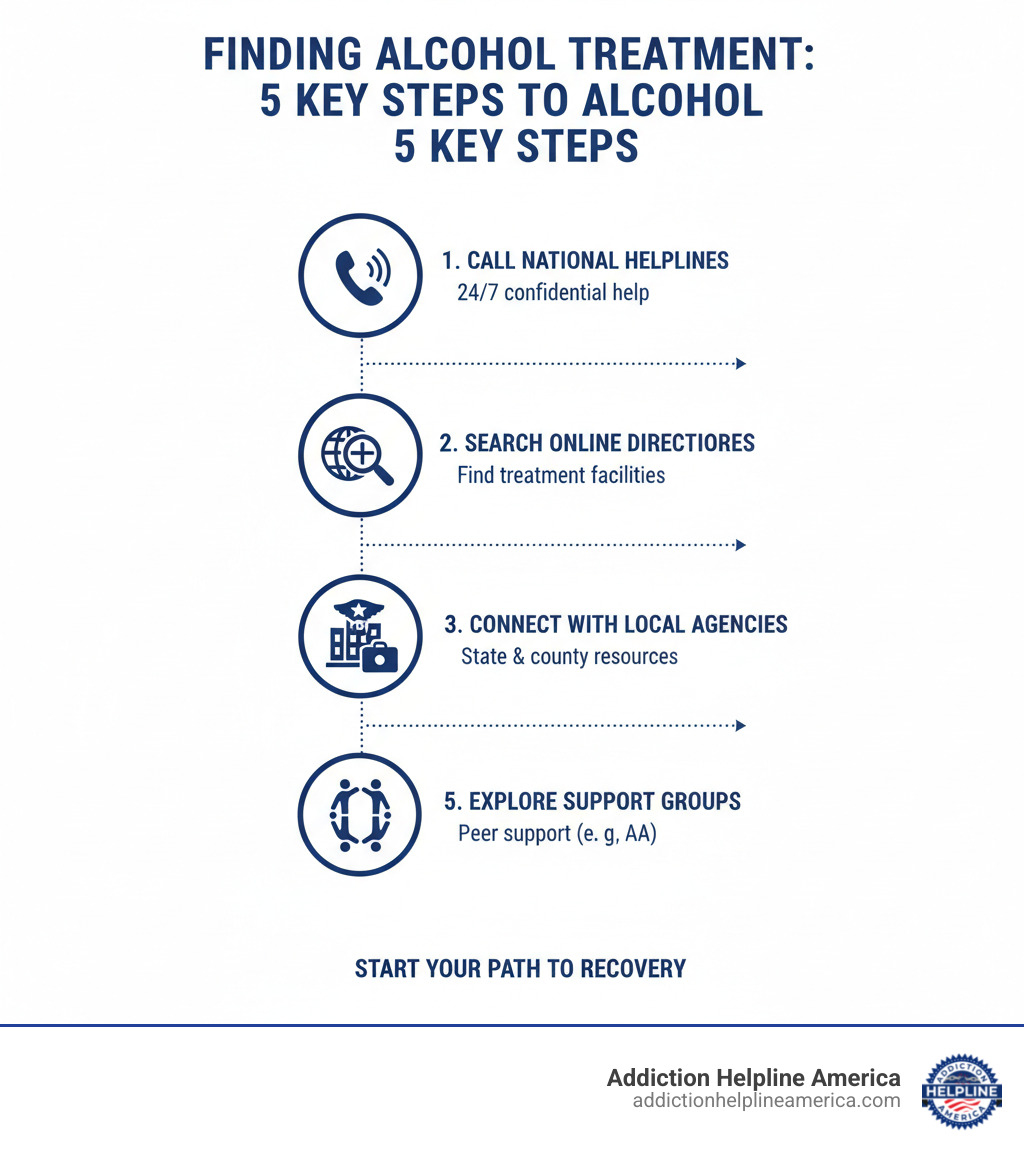
Alcohol treatment centers near me word roundup:
Step 1: Recognizing the Signs You Need Professional Help
Admitting that alcohol has become a problem isn’t easy. If you’re wondering whether you need help, that question itself is often your answer.
Alcohol Use Disorder (AUD) is a medical condition where controlling alcohol use becomes incredibly difficult, even when it’s causing serious problems. It’s not about willpower—it’s about recognizing when professional support can make all the difference.

The journey to recovery often starts with a quiet moment of clarity. These moments are different for everyone, but they all point to the same need: it’s time to reach out.
A professional assessment is one of the most valuable steps you can take. If you’re questioning whether you or someone you love needs help, trust that instinct. At Addiction Helpline America, we offer confidential guidance to help you understand your situation and determine if searching for alcohol treatment centers near me is the right move.
Key Symptoms of Alcohol Addiction
Understanding what addiction looks like helps cut through denial. These symptoms can show up in your body, daily life, and emotions.
- Increased tolerance: You need more alcohol to get the same effect you used to.
- Withdrawal symptoms: When you try to stop, you experience physical and mental withdrawal symptoms like tremors, anxiety, sweating, or nausea. Your body has become physically dependent.
- Loss of control: You often drink more or for longer than you intended, despite telling yourself you wouldn’t.
- Neglecting responsibilities: You neglect work, school, or family responsibilities because of your drinking.
- Continued use despite negative consequences: You keep drinking even though it’s causing problems with your health, relationships, or the law.
- Unsuccessful attempts to cut down: You’ve tried to cut down or quit on your own multiple times but haven’t been able to succeed.
- Behavioral and social changes: You give up activities you once enjoyed, isolate yourself from loved ones, or hide your drinking from others.
- Psychological indicators: Your thoughts are dominated by intense cravings for alcohol. You may also use alcohol to cope with feelings like stress, anxiety, or depression, creating a difficult cycle. About half of individuals with a substance use disorder also experience a co-occurring mental health condition, and treat both together.
If several of these signs feel familiar, it’s time to consider professional help. Reputable organizations like the National Institute on Alcohol Abuse and Alcoholism (NIAAA) offer confidential self-tests that can help you assess your situation. Recognizing these signs isn’t about labeling yourself—it’s about opening the door to recovery.
Step 2: Understanding the Different Types of Treatment Programs
When you search for alcohol treatment centers near me, you’ll find that not all programs are the same. This is good news, as it means you can find a program designed for your specific situation.
Alcohol treatment exists on a spectrum, from intensive, 24/7 care to flexible programs that fit around your life. Professionals refer to this as a “continuum of care,” meaning you might move between different “levels of care” as your needs change during recovery.
Levels of Care in Alcohol Treatment
Each program type serves a specific purpose on the recovery journey.
Medical Detox is often the first step, especially for those with long-term, heavy alcohol use. It provides a safe, supervised environment where medical professionals manage potentially dangerous withdrawal symptoms 24/7, preparing you for the next stage of treatment.
Inpatient or Residential Treatment involves living at a facility full-time, typically for 30 to 90 days. This immersive environment removes you from daily triggers and provides round-the-clock support, including individual and group therapy. It’s ideal for those needing intensive structure or who have an unstable home environment.
Partial Hospitalization Programs (PHP) are a form of “day treatment.” You attend the facility for several hours a day, multiple days a week, for comprehensive therapy but return home in the evenings. PHP serves as a bridge between inpatient and outpatient care.
Intensive Outpatient Programs (IOP) offer another step down in intensity, with therapy sessions for a few hours a day, several times a week. This level works well if you have work or family commitments but still need substantial support. Many people transition to an IOP after completing a higher level of care.
Standard Outpatient treatment is the most flexible option, usually involving one or two therapy sessions per week. It’s suited for those with milder AUD or as a long-term support measure after completing a more intensive program.
For more detailed information on various options, we encourage you to explore our Alcohol Rehab Options guide.
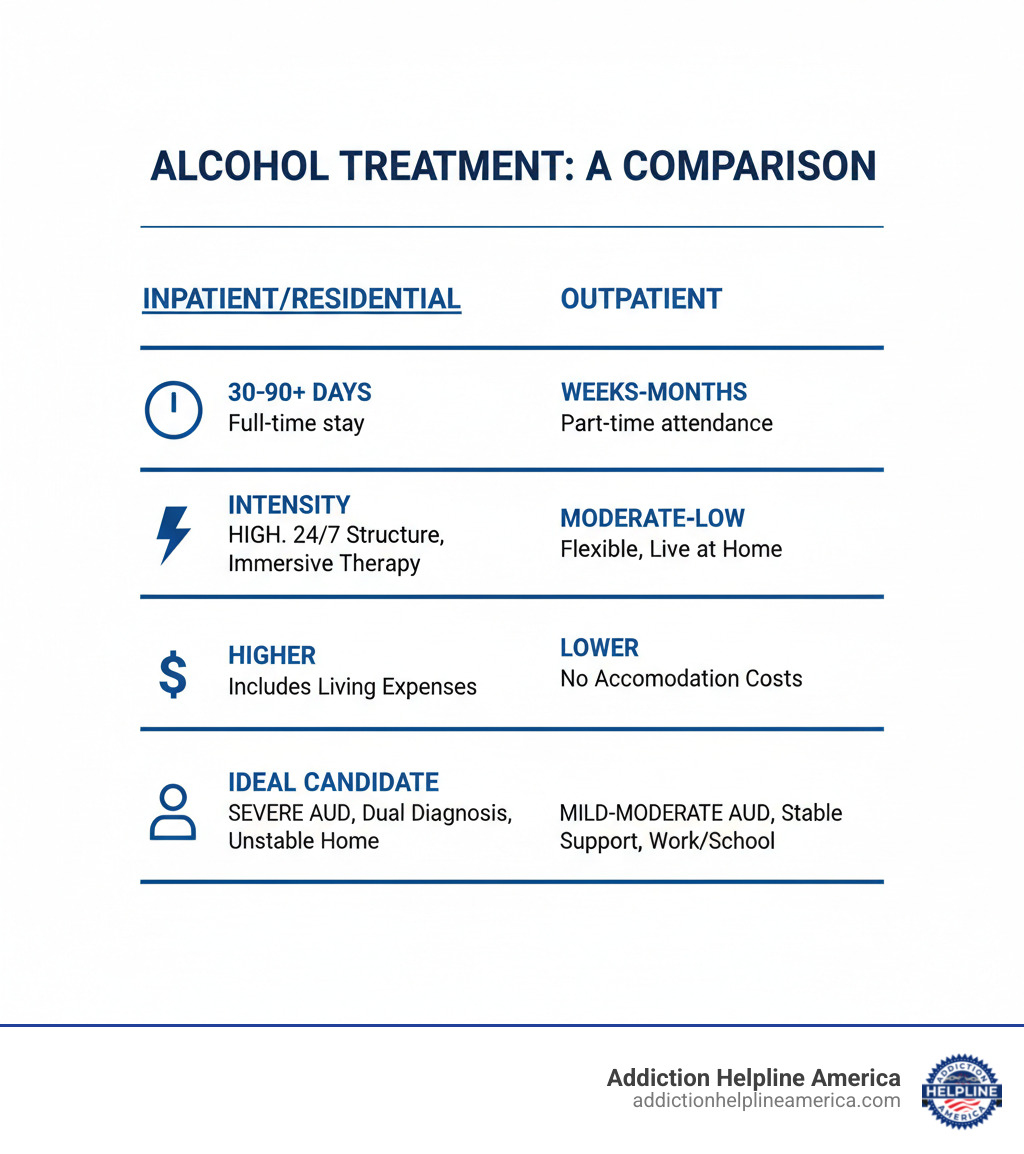
| Feature | Inpatient/Residential Treatment | Outpatient Treatment (PHP, IOP, Standard) |
|---|---|---|
| Duration | Typically 30, 60, or 90 days, sometimes longer | Varies widely: weeks to months, depending on program intensity and individual needs |
| Intensity | High: 24/7 supervision, structured schedule, immersive therapy | Moderate to low: several hours per day/week, allows for external commitments |
| Cost | Generally higher due to accommodation, meals, and constant care | Generally lower, as it doesn’t include living expenses |
| Ideal Candidate | Severe addiction, co-occurring mental health issues, unstable home environment, need for medical detox | Milder addiction, stable home environment, strong support system, need to maintain work/family life |
The “right” choice depends on your specific circumstances, the severity of your drinking, your support system, and your overall health.
How Long Does Alcohol Treatment Last?
The honest answer is: it depends. Recovery is personal, and there’s no one-size-fits-all timeline.
However, programs often follow common timeframes. 30-day programs are great for stabilization and initial education. 60-day programs allow more time to address underlying issues and practice new coping skills. 90-day programs are frequently recommended by professionals, as research shows this duration gives you time to internalize new behaviors and build a solid foundation for lasting recovery.
Long-term options, such as extended residential care or sober living homes, are also available. The most important thing is that your treatment length is customized to your needs. At Addiction Helpline America, we can help you understand your options and connect you with alcohol treatment centers near me that offer the right level of care for you.
Step 3: What to Look for in Alcohol Treatment Centers Near Me
You’ve recognized the need for help and understand the different programs. Now it’s time to find a quality center. When searching for alcohol treatment centers near me, it’s easy to feel overwhelmed, but knowing what to look for can simplify the process.
The right facility will have the credentials, experience, and approach that align with your needs. This is an investment in your future, and you deserve the best possible care.

How to find local alcohol treatment centers near me
There are several reliable and confidential ways to locate treatment centers in your area.
- Trusted online directories like FindTreatment.gov, operated by SAMHSA, offer a confidential way to search for licensed facilities across the U.S.
- State-specific resources can provide local referrals. Many states have a Bureau of Substance Abuse Services or a County Drug and Alcohol Office that can help with assessments and funding information.
- Asking your doctor for referrals is another great option. Your physician or a mental health professional can offer personalized recommendations to providers they trust.
- Verifying your insurance coverage early in the process can save you time and prevent financial surprises. Many centers can help you understand what your benefits cover.
For a deeper dive into evaluating your options, check out our Best Alcohol Treatment Guide, which walks you through the decision-making process.
What to ask alcohol treatment centers near me
Once you’ve found a few potential alcohol treatment centers near me, ask these questions to determine if they’re a good fit.
- Is the facility licensed and accredited? State licensing is mandatory. Accreditation from organizations like The Joint Commission is a further sign of high-quality care and safety.
- What are the staff’s credentials? Your care should be provided by licensed and certified professionals, such as doctors, therapists, and counselors with expertise in addiction.
- Do you use evidence-based therapies? Look for centers that use scientifically proven methods like Cognitive Behavioral Therapy (CBT), Dialectical Behavior Therapy (DBT), and Medication-Assisted Treatment (MAT).
- What is the admission process? Ask about the required assessments, how long intake takes, and what you should bring with you.
- Do you have family involvement policies? Quality centers understand that addiction affects the whole family. Inquire about family therapy or educational programs that can help repair relationships and build a strong support system.
- What does aftercare planning involve? Recovery doesn’t end after treatment. A good facility will help you create a detailed aftercare plan with connections to support groups and ongoing therapy.
Choosing a specialized alcohol treatment center gives you access to staff and programs custom to alcohol recovery and co-occurring mental health disorders. At Addiction Helpline America, we can help you ask the right questions and find a center that checks all the boxes. Visit Find a Treatment Facility or call us for personalized guidance.
Step 4: Navigating Treatment Costs and Payment Options
Wondering how to pay for rehab can feel overwhelming, but the cost of alcohol treatment should not stand between you and recovery. Think of treatment not as an expense, but as an investment in your future—in your health, your relationships, and your life.

The good news is there are more ways to pay for treatment than you might realize. Options exist to make recovery accessible, regardless of your financial situation.
Most health insurance plans cover addiction treatment. Thanks to the Affordable Care Act (ACA), substance use disorder services are considered essential health benefits. This means your insurance likely covers at least part of your care. Many reputable alcohol treatment centers near me are in-network with major insurance companies, which typically means lower out-of-pocket costs for you. We can help you verify your insurance benefits to understand exactly what your plan covers.
State-funded programs can help if you have limited or no insurance. Many states provide funding for addiction treatment for residents who meet certain income requirements. Your local County Drug and Alcohol Office is a good place to start to learn about these resources.
Payment plans and financing options make treatment more manageable. Many treatment centers understand that paying upfront can be difficult. They may offer payment plans, financing options, or sliding scale fees based on your income and ability to pay.
Grants and scholarships may be available for those who qualify. Some non-profit organizations and state agencies offer financial assistance specifically for addiction treatment. This may require some research but can be a lifeline for those in need.
Private pay is always an option. If you have the financial resources or prefer not to use insurance, you can pay for treatment out-of-pocket. This offers maximum privacy and flexibility in your choice of care.
Don’t let financial concerns stop you from reaching out. Our team at Addiction Helpline America provides free, confidential guidance to help you understand all your payment options. We’ll work with you to find a program that offers both excellent care and a payment structure that works for your situation. Recovery is possible, and we’ll help you find a way.
Step 5: The Role of Aftercare and Family in Long-Term Recovery
Finishing a formal treatment program is a huge accomplishment, but recovery is a lifelong journey, not a destination. The real work often begins when you return to everyday life. That’s why aftercare planning and family support are essential for building a strong, sustainable recovery.

Support After Formal Treatment
Transitioning from a treatment center back to daily life can be challenging. Aftercare bridges this gap and helps you steer real-world triggers.
- Sober living homes offer a middle ground between intensive treatment and full independence. These residences provide a safe, substance-free environment where you can practice recovery skills with peer support and structure.
- Alumni programs keep you connected to a supportive community long after you’ve completed treatment. Many centers offer these networks for peer connection, events, and ongoing resources.
- Ongoing therapy, whether individual or group sessions, helps reinforce coping skills and provides a space to work through new challenges as they arise.
- Support groups like Alcoholics Anonymous (AA) provide an invaluable fellowship of people who have walked the same path. You can reach AA at (617) 426-9444 to find local meetings and connect with others who understand your journey.
How Family and Friends Can Help
Addiction affects the entire family, and recovery can too. Involving loved ones can significantly improve your chances of sustained sobriety.
- Family therapy is offered by many alcohol treatment centers near me to help heal damaged relationships, improve communication, and rebuild trust. These sessions focus on understanding and moving forward together.
- Education helps your family understand that addiction is a disease, not a character flaw. This shift in perspective allows them to better support you. Allies in Recovery offers an online learning platform for families to gain practical tools and knowledge.
- Healthy boundaries are an act of love that supports your recovery without enabling old behaviors. Professional guidance can help families establish these boundaries effectively.
- Encouragement from loved ones is powerful. Celebrating milestones and offering support during tough times can make all the difference.
- Family support groups provide a space for your loved ones to get their own support. Groups like Al-Anon/Al-Ateen (508-366-0556), Nar-Anon (1-800-477-6291), and Learn to Cope (508-738-5148) help family members learn coping strategies and remember they aren’t alone.
Recovery is a team effort. At Addiction Helpline America, we connect you with centers that prioritize both aftercare and family involvement to set you up for long-term success.
Finding the Right Help: National Resources and Helplines
When you’re in crisis or simply don’t know where to start, having someone to call can make all the difference. We know how overwhelming it feels to reach out for the first time, but these helplines exist for exactly this moment—to provide immediate, confidential support when you need it most.
National Helplines for Immediate Assistance
You’re never alone in this journey. Right now, trained professionals are standing by to help you find your path forward.
Addiction Helpline America is here for you with our confidential helpline. Our compassionate team provides free, personalized guidance to help you find the right recovery program from our extensive network of alcohol treatment centers near me. We understand that every situation is unique, and we’ll work with you to identify options that fit your specific needs, insurance coverage, and personal circumstances.
The SAMHSA National Helpline at 1-800-662-HELP (4357) is available 24 hours a day, 7 days a week, every single day of the year. This confidential and anonymous service, provided by the Substance Abuse and Mental Health Services Administration, offers treatment referrals and information in both English and Spanish. Whether it’s 3 p.m. or 3 a.m., someone will answer your call.
If you or someone you know is experiencing a mental health crisis or thoughts of suicide, the 988 Suicide & Crisis Lifeline provides free and confidential support around the clock. Simply call or text 988 to connect with trained crisis counselors who understand that addiction and mental health challenges often go hand in hand.
The Disaster Distress Helpline at 1-800-985-5990 offers immediate crisis counseling for those experiencing extreme stress, particularly related to disasters. While not addiction-specific, it can be a valuable resource during times when overwhelming circumstances might trigger substance use.
Many states also maintain their own dedicated helplines with local expertise and resources. In Massachusetts, the Bureau of Substance Abuse Services Helpline at 1-800-327-5050 is staffed Monday through Friday from 8:00 a.m. to 10:00 p.m., and on weekends and holidays from 8:00 a.m. to 6:00 p.m. If you’re in New Hampshire and facing a substance use or addiction-related crisis, you can dial 2-1-1 for assistance. Pennsylvania residents have access to the PA Get Help Now helpline at 1-800-662-HELP (4357) 24/7, or can use the live chat option online or text 717-216-0905.
For a comprehensive list of additional resources and helplines, visit our Addiction and Rehab Hotlines page. Reaching out for help isn’t a sign of weakness—it’s one of the strongest, bravest things you can do. Help is always available, and you deserve support on your path to recovery.
Your Path to Recovery Starts Today
Taking the first step toward addressing alcohol addiction is the most important one. It requires courage, self-awareness, and a willingness to accept change. We understand that finding the right alcohol treatment centers near me can feel daunting, but this guide has equipped you with the knowledge and tools to confidently move forward.
Here’s what we want you to remember: Recovery is not just possible—it’s happening right now for millions of people. With the right support, personalized treatment, and a commitment to ongoing well-being, you can achieve lasting sobriety and reclaim a fulfilling life. The journey may not always be easy, but it is absolutely worth it.
You’ve learned how to recognize the signs that professional help is needed, understand the different types of treatment programs available, identify quality indicators in treatment centers, steer the financial aspects of care, and appreciate the critical role of aftercare and family support. These are powerful tools that put you in control of your recovery journey.
At Addiction Helpline America, we are dedicated to being your partner every step of the way. We offer free, confidential, and personalized assistance to help you connect with a treatment center that aligns with your unique needs and circumstances. Our extensive network spans all 50 states and the District of Columbia, meaning we can help you find quality care whether you’re in Alabama or Wyoming, Florida or Alaska, or anywhere in between.
You don’t have to figure this out alone. Our team understands the urgency and the emotions that come with seeking help. We’re here to listen without judgment, answer your questions, and guide you toward the right resources.
Don’t wait another day to start your new beginning. The life you’ve been hoping for—the one where alcohol doesn’t control your choices, your relationships, or your future—is within reach. For personalized, confidential assistance in navigating your options and connecting with a treatment center, Addiction Helpline America is here to help.
If you’re specifically looking for options in Colorado, we can help you find a rehab center in Colorado that meets your needs. Wherever you are, whatever your situation, we’re ready to help you take that crucial first step toward recovery today.
Our helpline is 100%
free & confidential
If you or someone you care about is struggling with drug or alcohol addiction, we can help you explore your recovery options. Don’t face this challenge alone—seek support from us.
Programs
Resources
Will my insurance
cover addiction
treatment?
We're ready to help
Find the best
drug or alcohol treatment
center
Are you or a loved one struggling with addiction? Call today to speak to a treatment expert.


